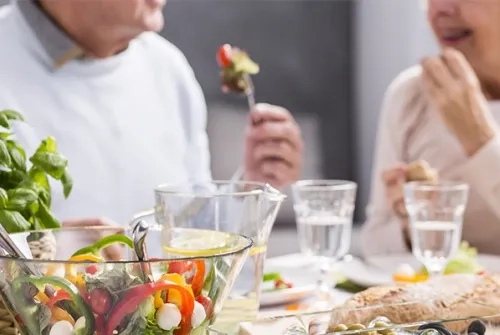Alo Yeditepe
Alo Yeditepe
What to do from Iftar to Sahur for a Healthy Ramadan
Since the month of Ramadan coincides with the spring months and days are now longer, the period of abstinence is elongated. Senior Dietitian and Senior Clinical Psychologist Merve Öz, who had stated that the eating and drinking order during the time spent between İftar, Sahur and these two meals is very important since the above-mentioned period is quite long, has listed.
Do not Immediately Consume the Main Course at Iftar
After warning that a break of 15 minutes is necessary after breaking the fast with a soup, Senior Dietitian and Senior Clinical Psychologist Merve Öz of Yeditepe University Hospital also added that only then the main course should begin.
Avoid Having a Fatty Diet
Suggesting that fried food and pastry should not be consumed in Iftar, Merve Öz said, “Fatty foods which we eat after a long period of hunger may cause digestive difficulties and stomach discomfort.”
Try to Avoid Rice and Pasta at Iftar
Expressing that the best quality carbohydrate is bread, Merve Öz warned that instead of rice, pasta and bulgur pilaf the first thing that should be consumed is bread. Quality breads such as whole wheat bread are healthier because they will increase satiety and are less likely to cause spikes in blood sugar.
Avoid White Bread or Pita Bread
Pita is one of the most consumed products in Ramadan. Stating that pita is white bread, therefore it will cause a sudden increase in blood sugar, Merve Öz continued as follows: “Besides, since it is difficult to set limits due to its taste, bread, which is the highest quality carbohydrate, should be consumed instead of pita bread. But the bread you will consume should be either whole wheat, einkorn, whole grain or rye bread. If anemia is present, bran bread may also be consumed.”
Always Consume Salads In Iftar
Salad can fill the stomach and therefore prevent you from eating high-calorie foods. In addition, the fiber one can receive from salads would also help with slow intestines.
Do not Neglect the Consumption of Yogurt or Kefir
Explaining that yogurt and kefir have a very pronounced effect that strengthens immunity thanks to the probiotics in their content, Merve Öz added that, “Yogurt and kefir, which regulate the intestinal flora, also do help to eliminate the constipation problem that can be experienced during Ramadan. In addition, kefir's low glycemic index and high protein content can provide a feeling of satiety by staying in the stomach for a long time.
Make Sure to Wake Up for the Sahur
In Ramadan, our bodies stay hungry for a long time when we do not wake up for Sahur. After expressing that this situation will lead to muscle atrophy and slowing of metabolism, Merve Öz has added that as a result of this, our bodily immunity would decrease.
Prefer Light and Filling Foods in Sahur
Emphasizing that while heavy foods such as pastries and fries are commonly eaten and slept on after the Sahur, Merve Öz has added that consuming these foods would cause heaviness, sourness and burning in the stomach after one does wake up in the morning. She has stated that instead of these, light and filling meals such as a breakfast and a soup should be preferred.
Consume Eggs at Sahur
Merve Öz has said that an egg consumed during the Sahur both enables one to stay full during the day also added that since the egg is protein-rich, it would help one to secure their daily protein intake. Afterwards she also said that egg is the highest quality protein after mother’s milk.
Drink Plenty of Water Between Iftar and Sahur
Pointing out that the longer the fasting period is, the longer our body becomes dehydrated, Merve Öz said, “The way to prevent this is to consume 10-12 glasses of water between Iftar and Sahur. It is possible to calculate the amount of water needed as approximately 30 mL per kilogram. For instance, a 60 kg person needs 1800 mL water since 60 x 30 equates to 1800.
Have a Snack High in Fiber to Prevent Intestinal Laziness
Dietician Merve Öz said, “Dried apricots, prunes, dried figs, and pears are among the fruits that would relax your intestines,” and continued as follows: “If you have been experiencing intestinal laziness for a long time, throw 3 apricots into warm water before going to bed at night. When you wake up for Sahur, you can eat these apricots and drink the water.
Consume Fruits in the Snack Between Iftar and Sahur
Antioxidant molecules, which are abundant in fruits, strengthen our immune system by helping to prevent cell damage. Reminding that a varied and colourful diet strengthens the immune system, Dietitian Merve Öz also stated that different fruits result in the intake of different antioxidants, therefore advising that one should not always consume the same fruit, instead one should add variety.
Do not Consume Too Much Dessert
With the beginning of Iftar, dessert becomes indispensable for many people. Merve Öz however said that “Be careful to consume fruits, which are rich in vitamins and minerals, instead of high-calorie desserts. If you are going to consume dessert, you can choose milk dessert or ice cream instead of sherbet-based desserts. Also, instead of immediately consuming the fruit or dessert you intend to consume right after dinner, you may consume it after a 2 hour-break.
Do not Forget to Exercise
Underlining that regular exercises strengthen our immunity by supporting both our physical and mental health, Senior Dietitian and Senior Clinical Psychologist Merve Öz of Yeditepe University Hospital said: “If you are able, you should walk your daily 30 minutes without tiring yourself too much.”
Press Coverage: posta | krttv | ankahaber | cnnturk | karar | turktime | hibya
About
Faculty and Year of Graduation:
Yeditepe University Faculty of Arts and Sciences, Department of Psychology and Faculty of Health Sciences, Department of Nutrition and Dietetics, 2016
”
See Also
- What is Vitamin A? What are the benefits of Vitamin A?
- What is Selenium? What Does It Do? What are the Benefits?
- Does the Sweltering Heat Affect Our Mental Health?
- What is Vitamin E?
- What is Coenzyme Q₁₀? What are the Benefits of Coenzyme Q₁₀?
- What is Vitamin B12? What are the Symptoms of B12 Deficiency?
- What is Mythomania (Pathological Lying Disorder)? What Causes Mythomania?
- What is Emotional Hunger? How Does It Arise?
- Benefits of Spices
- What Does Narcissist Mean? Narcissistic Personality Disorder
- At What Age Should Children Start Using Social Media?
- What is the Ideal Age for Marriage?
- Special Nutrition Recommendations for the Eid
- The True Face of the Protein Myth
- What Are the Benefits of Beets?
- Suggestions to Get Rid of the Menopause Belly
- "Is the Watermelon Diet Healthy?
- Ways to Boost Mental Resilience
- Frequently Asked Questions about Detox
- Boost Your Immunity Naturally
- Which Foods Should be Consumed Together?
- How Do You Approach a Child Who Is Reluctant to Go to School?
- Stop Blaming Yourself
- The Concern of Being a ‘’Good Mother’’ in Pregnancy
- It is Possible to Lose Weight by Dominating Your Brain
- Mom, Can I Sleep With You?
- 9 Points to Be Considered for a Healthy Ramadan Month!
- Emotional Eating May Be the Cause of Your Weight Gain
- The Healthiest Summer Fruits
- Shining Star of the Tables: Probiotics
- The Problem may be the Lack of Self-Confidence!
- Ways to Deal with Quarantine Weight
- Burnout Syndrome at Work Gains Weight
- Children Should Be Away From Fast Food Toy
- Children's Eating While Studying Prepares the Ground for Obesity
- Permeable Bowel Syndrome Can Prepare the Ground for Diseases
- Suggestions to Prevent Children from Gaining Weight While Still
- 8 Suggestions to Keep the Immune System Strong in Ramadan
- 8 Suggestions for Kids with Focus Problems
- It is also Possible to Lose Weight During the Holidays!
- Immune Enhancing Nutrients
- Is Co-Sleeping With the Child Right?
- Healthy New Year's Eve Table Suggestions
- Do not take unneeded calories to your body
- Suggestions to Increase Metabolic Rate…
- Nutrition Recommendations Before the Exam
- How to Feed Children in Summer?
- Is There a Nutritional Difference Between Sports to Increase BMI and Sports to Lose Weight?
- What Should You Do to Avoid Gaining Weight for the Holidays? Do Not Be a Victim of the Buffet
- Cancer and Nutrition
- Nutrition and Diet
- Healthy Diet
- Elderly Care
- Alkaline Nutrition
- 9 Tips to Prevent You from Gaining Weight While at Home
- 9 Suggestions to Fix Childrens Deteriorated Eating Habits
- Fibromyalgia May Be the Cause of Persistent Pain
Alo Yeditepe




